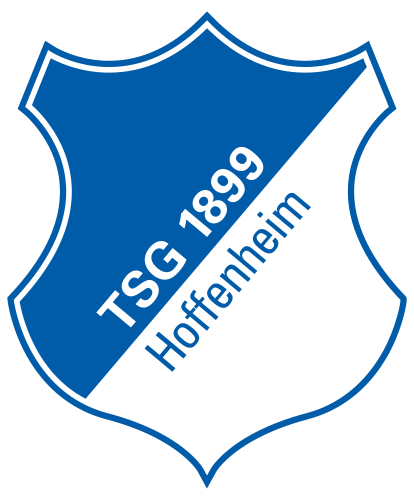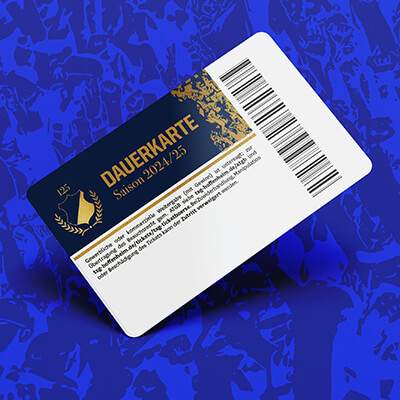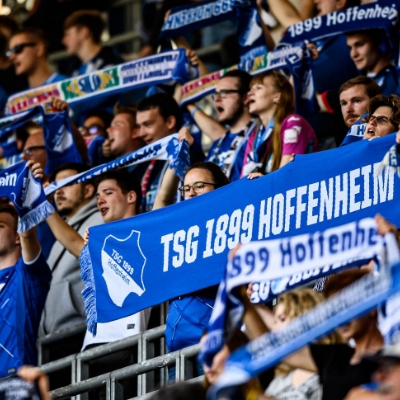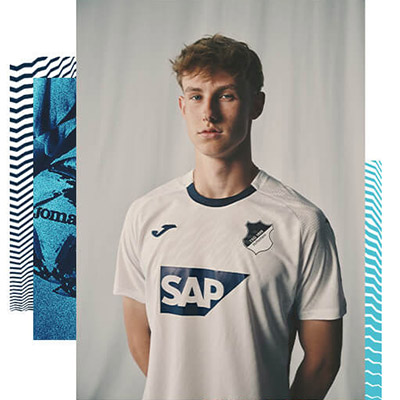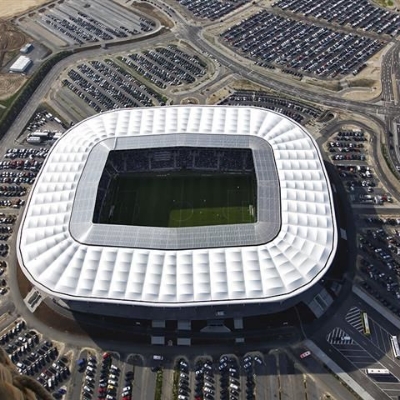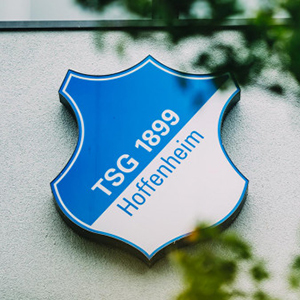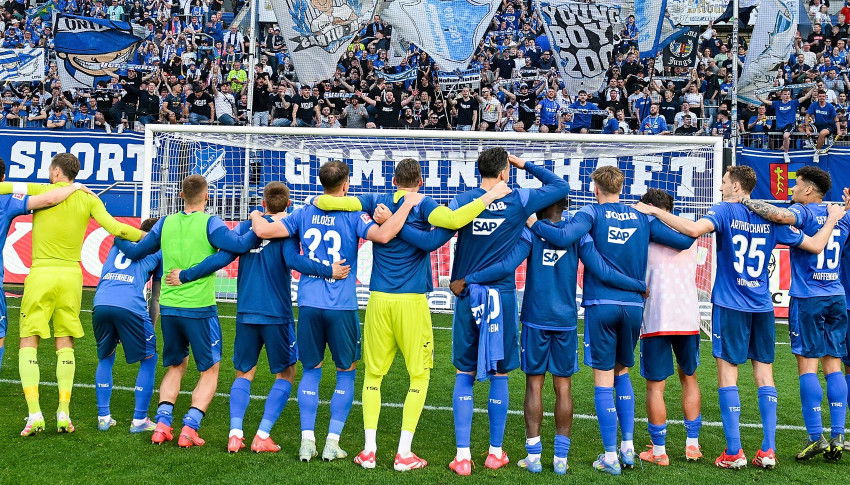"The system is falling to pieces"
We're absolutely delighted to have got you both together for a chat. This one will be more about responsibility than back fours. What role should football fulfil? Given that we're currently in the Klima Arena in Sinsheim, which was established by Dietmar Hopp, it seems only appropriate that we begin with the obvious question: to what extent is climate change also an issue for football?
Andreas Rettig: "I didn't become aware of the issue because Greta Thunberg was travelling up and down the country. I started to develop a social awareness when I was in Freiburg, the city with the first green mayor in Baden-Württemberg. At SC Freiburg, we were the first in the Bundesliga to install solar panels on the roof; and when I was at FC Augsburg, we built the stadium C02-neutrally. My interest in the issue is driven by a deep conviction and not because it's 'en vogue'. But the issue of climate catastrophe is increasingly establishing itself in the consciousness of many people – in part thanks to Greta. Professional football clubs should be aware of the issue too given the feedback it has generated. That's what I'm hoping, at least."
Dietmar Hopp: "For more than 20 years, we've been hearing and reading that the climate is developing unfavourably. I've become more and more concerned about how my grandchildren's generation will live in the future. That was the motivation behind setting up the Klima Arena as a place for information and experience. This Klima Arena has helped to build awareness of climate change among lots more people, because it has made it more accessible, tangible and perceptible. The summers are getting hotter, Christmas is almost evergreen and floods are increasing. It's no longer an abstract concept when academics talk about it. We're all responsible for what becomes of this planet. And I hope that professional football will also ask itself this most important of existential questions."
After the interview, which lasts over an hour, Andreas Rettig takes the time to go on a guided tour through the Klima Arena with Bernd Welz, the Chairman of the Climate Foundation for Citizens. Rettig's conclusion? "It's impressive what Dietmar Hopp has created here."
Do we still need Greta Thunberg and the Fridays for Future movement in order to convince those who still deny the existence of man-made climate change?
Hopp: "We certainly do still need Greta, but not in the over-hyped way we've experienced recently. Actions such as the Atlantic crossing felt a bit like a PR stunt that was planned by her entourage. But it goes without saying that the girl has kickstarted something – although it is my belief that the way in which her parents and advisors have overburdened her is irresponsible. The Friday demonstrations were important but now the protests should enter a new phase; children need to go to school and get an education for their later lives. In addition, they need to learn how climate change can be battled; that's the purpose of an extracurricular place of learning like the Klima Arena. We need large-scale efforts and I'd like to see more of that from politicians. I don't understand, for example, why massive efforts are not being made to advance hydrogen technology, even though everyone knows that electromobility doesn't have much of a future."
Throughout the discussion, the tone between the two men is open, clear and markedly different, but always friendly. What is striking is the mutual interest in holding a discussion and understanding the other person's arguments – something that's often missing in the heated and hostile debates held nowadays.
"We mustn't play environment and economy off against each other"
To what extent is this movement a challenge for football as well, Mr. Rettig?
Rettig: "I can only agree with what Mr. Hopp said about Greta and all the hype around her. It's now down to all of us, especially decision-makers from the fields of economics, politicians and sport, to get the ball rolling. But in football, our thoughts are overly focused on issues like how to make as much money as possible. It's wrong to define ourselves solely by turnover increases and revenue maximisation, as important as that is. It's not the only thing that counts. I'm not a dreamer; I believe economic rationality to be hugely important. We must not play the environment and the economy off against each other. But we do need to ensure we at least place them on an equal footing."
Hopp: "More than that is required. There's a lot of pressure for football to take an active role too. And I believe there's a chance for this to happen. We at TSG Hoffenheim can help and show that one can become engaged in various ways and projects. This Klima Arena is a clear example. TSG has started a range of sustainability initiatives; for example, by making sure starting in August 2019 that all of its activities were carried out climate-neutrally. Another thing that's important is that the fans are on board with this issue. I'm specifically thinking at this point about the climate ticket, whereby fans pay a euro extra for their home match tickets. At Mainz, St. Pauli, Freiburg and Bremen, sustainability enjoys great significance too. But it's also important that we get a major player like a Bayern Munich or a Borussia Dortmund involved on this issue in order to get as many people as possible on the bandwagon and to maximise the appeal."
Rettig: "I would certainly be happy if ecological aspects were taken into consideration in the DFL's licensing procedure. It doesn't make sense to me that we define the lux values for the floodlights and how many centimetres squared of a shirt can be taken up by advertising, but there are no ecological stipulations included in the DFL's licensing regulations."
Which criteria might they be?
Rettig: "Regarding youth academies, for example, not everyone was shouting from the rooftops when they were made compulsory (editor's note: Rettig presided over the DFL Committee for Youth Academies for six years). I think that we've now reached the point again where we need to decide for the clubs what is good for them. By way of an example, it could be made so that clubs that set up e-loading stations, use solar panels and produce sustainably when it comes to merchandising will benefit from the media revenues. That has a knock-on effect if every club knows that they will be rewarded if they take action in favour of the environment."
Hopp: "Generally speaking, the clubs should be incentivised to operate sustainably. Either by giving them a greater share of the revenues or by guaranteeing them attention on a larger scale, for example. Everything is set in stone in the media contracts; why is that not also the case when it comes to the frequency of publications on such topics by the club's own channels?"
Rettig: "Too little action is taken by the DFB and the DFL. The opportunity to address the issue in a way that makes a public impact is being missed. Hoffenheim are deservedly praised for their climate neutrality. But we have 18 million visitors to our stadiums per season. That represents 8,000 tonnes of C02 emissions per matchday. The federation needs to address the task of developing concepts for travel management. Instead, the only efforts made are to increase the revenue side."
"Football is a national treasure and a people's sport"
Now we've come to the topic of the commercialisation of football. How big is the danger that football is alienating itself from the people?
Hopp: "The main reason why the system is falling to pieces is because the financial fair play rules introduced by associations such as UEFA and FIFA are not being taken seriously. For example, if the owner of Paris St. Germain invests there, signs a player like Neymar and declares the transfer fee of €220 million as a marketing expense, that's absolutely crazy. If that's allowed, you can throw financial fair play in the trash. The situation is only better in Germany because of the 50+1 rule, because it enables financial fair play to be implemented the way people wanted it to be. This is how the big international clubs are able to leave the competition trailing in their wake."
Rettig: "I get it when supporters say they are losing that emotional connection; it's just decision-makers sitting there who are doing as they please with the club. I also believe the claim that German football would be more internationally competitive without the 50+1 rule to be total rubbish. You can't win a competition against oligarchs, sovereign funds or Chinese conglomerates. It was an old wives' tale that Neymar would move to Bayern for €250 million. In that case, the Qataris would've simply paid 300 million. I don't wish to condemn investor money in general. I always say that they should invest their money if they adhere to the rules of the game, but they need to accept the culture here. Football is a national treasure and a people's sport."
The two parties to the discussion have a strong connection to this "people's sport". Dietmar Hopp was among those who were inspired by a moment that marked the start of football's importance in the early days of the Federal Republic of Germany. It was the 1954 World Cup title and his idol Fritz Walter that led the 14-year-old Hopp to join a football club, TSG Hoffenheim. Andreas Retting was born almost a decade afterwards but the club where his heart lies has a close connection to the Miracle of Bern. Rettig, who hails from the Rhineland, is a member at RW Essen, who became German champions in 1955 under Germany's World Cup-winning coach Helmut Rahn.
But the "people" that you mentioned and the transfer fees and salaries in force are worlds apart.
Rettig: "We're really falling short if the only way we define ourselves is by how much money we generate. What the DFL additionally generates for all the clubs in the form of TV contracts then has a discount applied and is paid to the players and advisors anyway."
Hopp: "Exactly. Phase-shifted and each month anew." (nods)
Rettig: "So why not hold them to account too given they are the main beneficiaries?"
Hopp: "The DFL has still made the best of the situation to date. If its boss Christian Seifert was not such an excellent salesman of TV rights, then the Bundesliga would've perhaps fallen a long way behind by now. The price that the television spectators pay for that is that they can now no longer watch every football match on TV. I personally have no desire to pick out all the possible channels and subscribe."
Rettig: "Football is losing people who are turning their backs on the game due to the golden steaks. And the next TV contract will only mean that the player is able to butter his streak with platinum. The connection is disappearing. Perhaps I'm being overly sentimental when I say this but I believe the singing prior to the match, when the club song is played, to be wonderful. That's something that connects the people of a community. The danger that the power of football will diminish and that lots of people will experience an emotional disconnect is also partly to do with the fact we no longer have any credible personalities. The Infantinos of this world and the corruption everywhere naturally also rub off negatively on football as a whole. But the same can be said of the church, which lurches from scandal to scandal. In politics too, there are not all that many credible characters."
Attitudes. Values. They are matters where Dietmar Hopp and Andreas Retting are clearly on the same wavelength. Dietmar Hopp founded the association Kick Into Life back in 2001 as a means of giving youths direction and prospects in life through sport.
So should another of the focal points going forward be a stronger emphasis on sustainability in football as well as social responsibility, which is termed corporate social responsibility (CSR)?
Hopp: "I've already said in an interview once before that every club should be obliged to spend three percent of their budget on CSR projects. I believe that to be both reasonable and affordable. Unfortunately, the suggestion fell on deaf ears."
Rettig: "I endorse that suggestion 100 percent. For example, we can make CSR officials obligatory for the clubs, just like when the clubs had to employ fan representatives. The most important topics, namely sustainability and the future, do not carry much weight with the DFL. If there's an annual turnover of €4.6 billion, then investments need to be made in research and development as well."
The new DFB president Fritz Keller generates a sense of hope for both Dietmar Hopp and Andreas Rettig. The former SC Freiburg boss has an impeccable reputation and is a successful entrepreneur but at the same time is seen as a down-to-earth guy who attaches importance to traditional values.
Rettig: "We're now facing the fundamental question of where we want football to go. Do we want corporate-style thinking, employed executives and directors who say that we will primarily be guided by our company and share value and whatever havoc happens, happens? Or would we prefer to think along the lines of a family business that is spread across generations, and thinks and acts with a long-term mindset. We should become the most down-to-earth, the most social and the most sustainable league. This would be a new DNA for the Bundesliga that is worth fighting for. Nowadays, young people are protesting on the streets for such issues at the age of 15. When I see how generation Z thinks, then it is of real value for Germany as a footballing nation if we can credibly say: 'The clocks tick differently here.' And then if we win one cup less, so be it."
Rettig looks over admiringly at Dietmar Hopp, who founded SAP in 1972. The entrepreneur and his colleagues used an intelligent strategy and long-term planning to transform it into a successful global group. And at the same time, the 79-year-old still enjoys an outstanding reputation as a kind boss among his staff. You can see that Rettig respects what he has achieved in his lifetime.
"The work being done in Hoffenheim is exemplary"
Is there also a real need to catch-up when it comes to youth development?
Hopp: "I believe that the professional clubs carry a very high level of responsibility to keep close tabs on all aspects of the youngsters' lives, whether it's their educational, professional or personal development. We set up Kick Into Life for this very reason and put in place professional structures to offer youngsters a second education. Because ultimately it's a maximum of two percent per year group who earn enough money from professional football by the end of their career to set themselves up."
Rettig: "You can break your shin bone or tear your cruciate ligament in the blink of an eye. There's no replacement for a dual education. A statement like the one Mr. Magath once made, in which he advised a young player (editor's note: Julian Draxler) to abandon his school qualifications, is of little help in this context. That incident actually prompted me to send him a letter at the time. However, the high-quality work consistently being done in Hoffenheim in terms of educational support is exemplary."
Hopp: We're even planning to go one step further and found a private school, because that is seemingly the only way to allow the youngsters to more easily combine elite-level sport with their educational requirements. At present, they are placed under enormous strain."
Rettig: "I can only congratulate you on that if you manage to get the private school set up. That's exactly the right way to go about achieving the highest-possible degree of flexibility. And the personal development that you alluded to is immensely important. I need to create the correct awareness in the academies and tackle other issues (beyond making a pass with the instep) in order to make it clear the kind of dream world we're living in. One part of that is always telling the young people that they enjoy this care and comfort because they're wearing the shirt. It doesn't apply to everyone. And at some point it's all over. But it's still too difficult for us to convey that message. Because we have too many protagonists who preach water but themselves drink wine, to put it clearly."
We're totally amazed. Dietmar Hopp and Andreas Rettig have been sitting side by side for the past hour and we're coming to the realisation that you're not as different as people believe.
Hopp: "We're actually very much in agreement for the most part." (laughs)
Rettig: "I've never criticised Mr. Hopp for his engagement. For me, it has always been about abiding by the rules of the game. Mr. Hopp has always done that exceptionally. As a former DFB managing director who played a role in your special exemption from the 50+1 rule, I know very precisely what work you have done and can only say congratulations. The difference between your engagement and that of Bayer AG in Leverkusen and Volkswagen in Wolfsburg is a rather profound one: you have invested your privately taxed money in order to develop TSG Hoffenheim. That's a huge difference. You played here yourself, you grew up here, you've invested in the infrastructure and the development of youth. Your engagement is as credible as it is sustainable. To my mind, that's a completely different scenario compared to when football is used as an advertising platform in order to sell cars, tablets or soft drinks. That's why I also defend your engagement, to the displeasure of some sections of the fan scene. At the same time, I will continue to fight for the preservation of the 50+1 rule and will do so with conviction."
Dietmar Hopp and Andreas Rettig both know that the millions invested in Hertha BSC by Lars Windhorst's Tennor investment group have only added fuel to the fire that is this debate – and left the neutral observer questioning how on earth under such circumstances Dietmar Hopp has been portrayed as an investor.
Hopp: "I believe your fight for 50+1 is right. I do not abuse the special exemption. If financial fair play worked, it would be enforced even more strictly – and everyone would see and recognise that TSG Hoffenheim and I keep to the rules."
Final question: what do you think football will be like in 10 years?
Rettig: "This question has to go to the visionary."
Hopp: "Please no European Super League or a DFB Cup final on the Asian market."
Rettig: "I'll turn my back on football on the day when we are obliged by the DFL for marketing reasons to put a sumo wrestler between the sticks because it's better for the Asian market."
Hopp: "But one thing must remain the same, regardless of the circumstances and how much a player earns: when a referee blows his whistle to signal kick-off, you focus on the game and forget everything else. That's football."
Andreas Rettig smiles. Dietmar Hopp takes the hand of his younger counterpart, squeezes firmly and says: "Thanks for the nice chat. Mr. Rettig, we have so many things in common that I think you and I can address each other informally." A nice touch to round off an informative discussion between two important men in German football.



